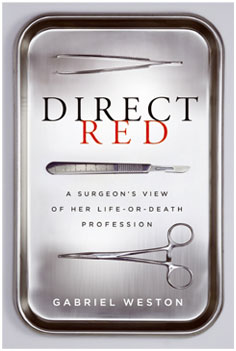
So why I might have been drawn to Gabriel Weston’s Direct Red – A Surgeon’s View of Her Life or Death Profession?
I stumbled on Direct Red at my local bookstore. I read the first few pages and was drawn to Weston’s beautiful voice. So I brought Direct Red home and couldn’t put it down.
Direct Red details Gabriel Weston’s training and early career as ear, nose and throat surgeon in London. Her book is divided into chapters based on her categorized clinical experiences. Each chapter serves as a repository for what seem, at times, to be loosely connected experiences. Sex, death, beauty, hierarchy, and ambition among others all have equal time.
The drama brought to Direct Red is not contrived. Weston’s humble view of hospital life is real. Her point of view lacks the self-absorbed position that one might expect of a surgical memoir. In fact, Weston mocks her own smallness in the face of the sick. While her flawless writing is at times unapproachable, her tendency towards self-deprecation keeps it real. Everybody loves a humble surgeon.
While I was drawn to Direct Red’s almost poetic narrative, I have to admit that I’m more accustomed to a looser American voice. And to read Direct Red you have to put up with Weston’s British medical lingo. It was only in the context of her story that I understood a trolley was something other than a train that tourists hang from in San Francisco (that would be a gurney or stretcher on this side of the pond).
I loved Direct Red. I suggest that it should be required reading for medical students. Medical trainees should feel the texture that Weston brings to an increasingly mechanical, featureless world of doctors and patients.